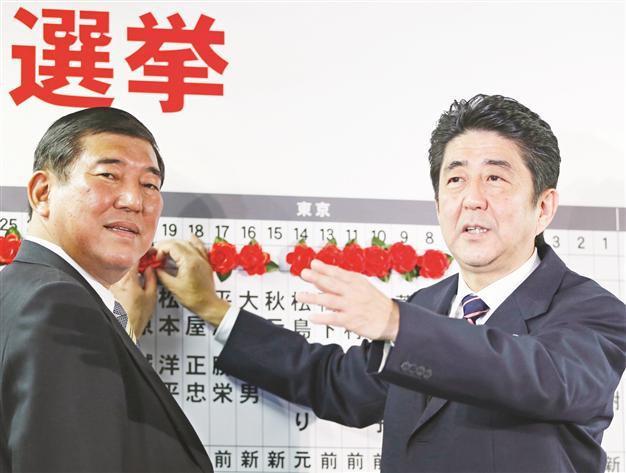Japan votes for nuke revival
TOKYO / FUKUSHIMA - Hurriyet Daily News

Japan’s main opposition Liberal Democratic Party’s (LDP) leader and likely-Prime Minister Shinzo Abe (R) and Secretary-General Shigeru Ishiba smile as they put a rosette on a name of a candidate in Tokyo. REUTERS photo
Japanese citizens chose the conservative Liberal Democrat Party (LDP) to lead the country in an election spurned by over half of voters despite a heavy agenda loaded with economic burdens, the nation’s nuclear future and tense regional ties with both China and North Korea.
Incoming Prime Minister Shinzo Abe is a tough nuclear power defender expected to also harden Japan’s tone with its neighbors and strengthen the military.
The LDP won nearly 300 seats of the 480-member lower house, according to unofficial results, claiming power alongside its ally, the New Komeito party, which is projected to maintain 300 seats to give the duo a two-thirds majority in the body.
‘Abe short-sighted’The new government will likely hold the parliamentary power required for changes yet the LDP expects to make major moves only after the upper house elections in June, which will change half of the seats there. Abe aims to re-open closed nuclear plants in the country despite public reactions after the devastating disaster in Fukushima last year. The mayor of Minamisoma, one of the areas most affected by the earthquake and that has districts located only 16 kilometers from the wreck of the Daiichi nuclear facility, has said he strongly opposes further nuclear moves.
“Abe is short-sighted,” Mayor Katsunba Sakurai told the Daily News yesterday, saying that it was his responsibility to think differently as the person in charge during and after the disaster. Some voters in the region are also completely opposed to returning to nuclear energy, while others said they agreed that the country needed atomic power to beat its economic bottleneck.
The Democratic Party of Japan (DJP) and Prime Minister Yoshihiko Noda resigned as chief of the party to take responsibility for the party’s loss in parliamentary elections.
Top executives of the LDP and the New Komeito party confirmed that they would form a coalition. Abe had stepped down from his Prime Ministry seat in 2007 due to health problems after about one year of service. One of the most significant promises Abe made to voters was raising national pride. This sits at the heart of Japan’s ongoing island dispute with China.
Abe is still expected to take a tougher stance against North Korea, which earlier last week escalated tensions with a new missile exercise crossing Japanese skies.
